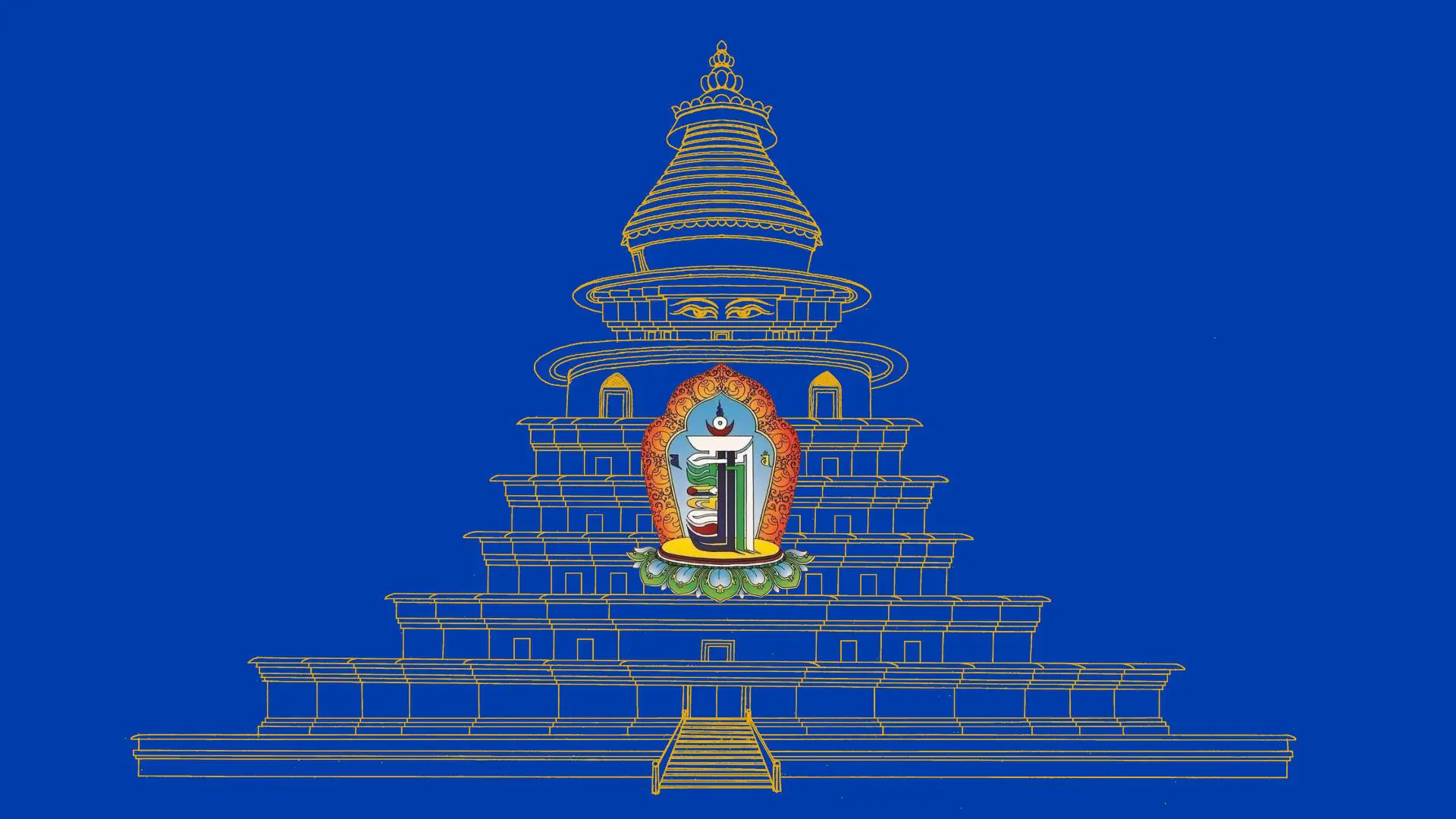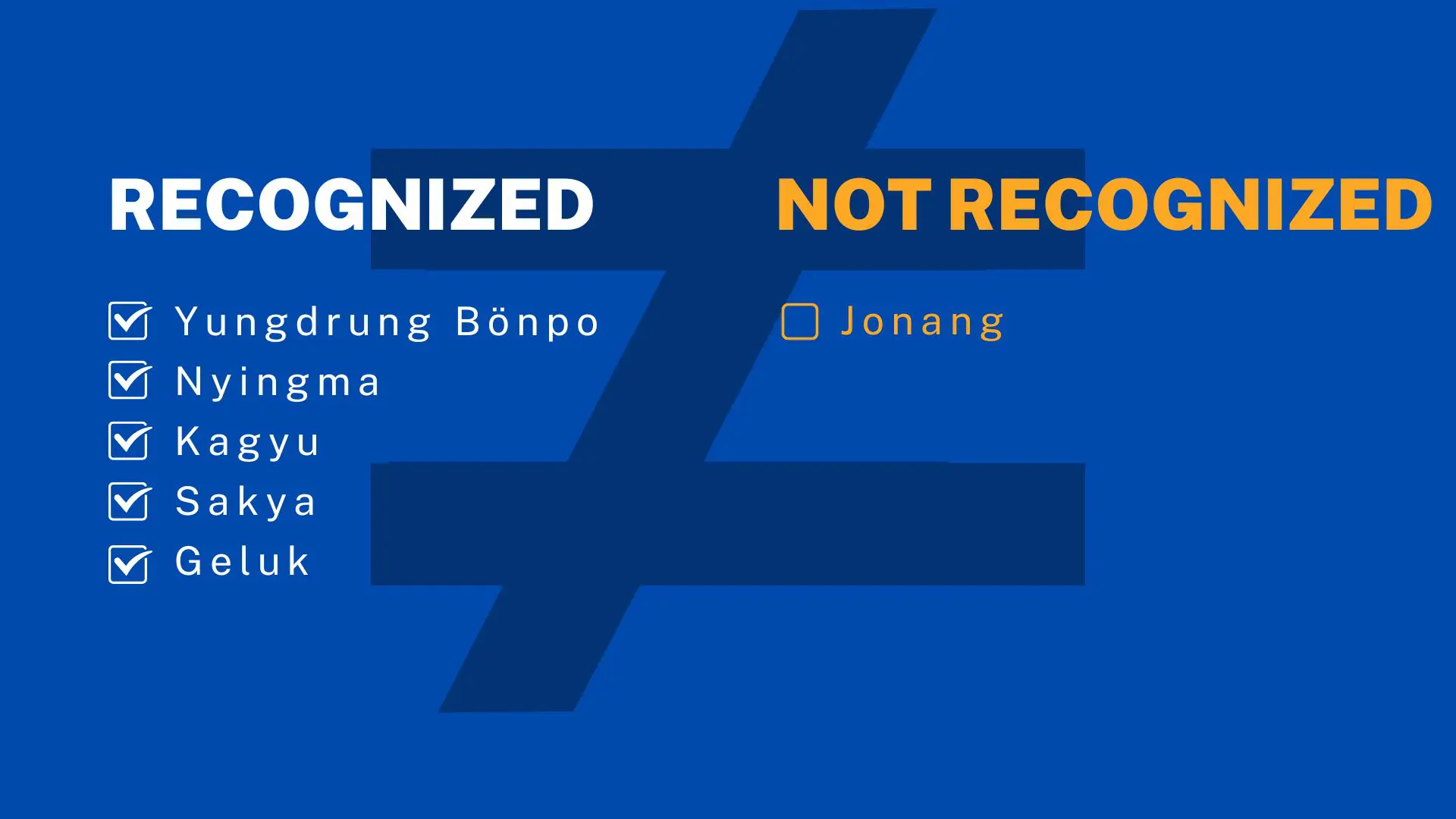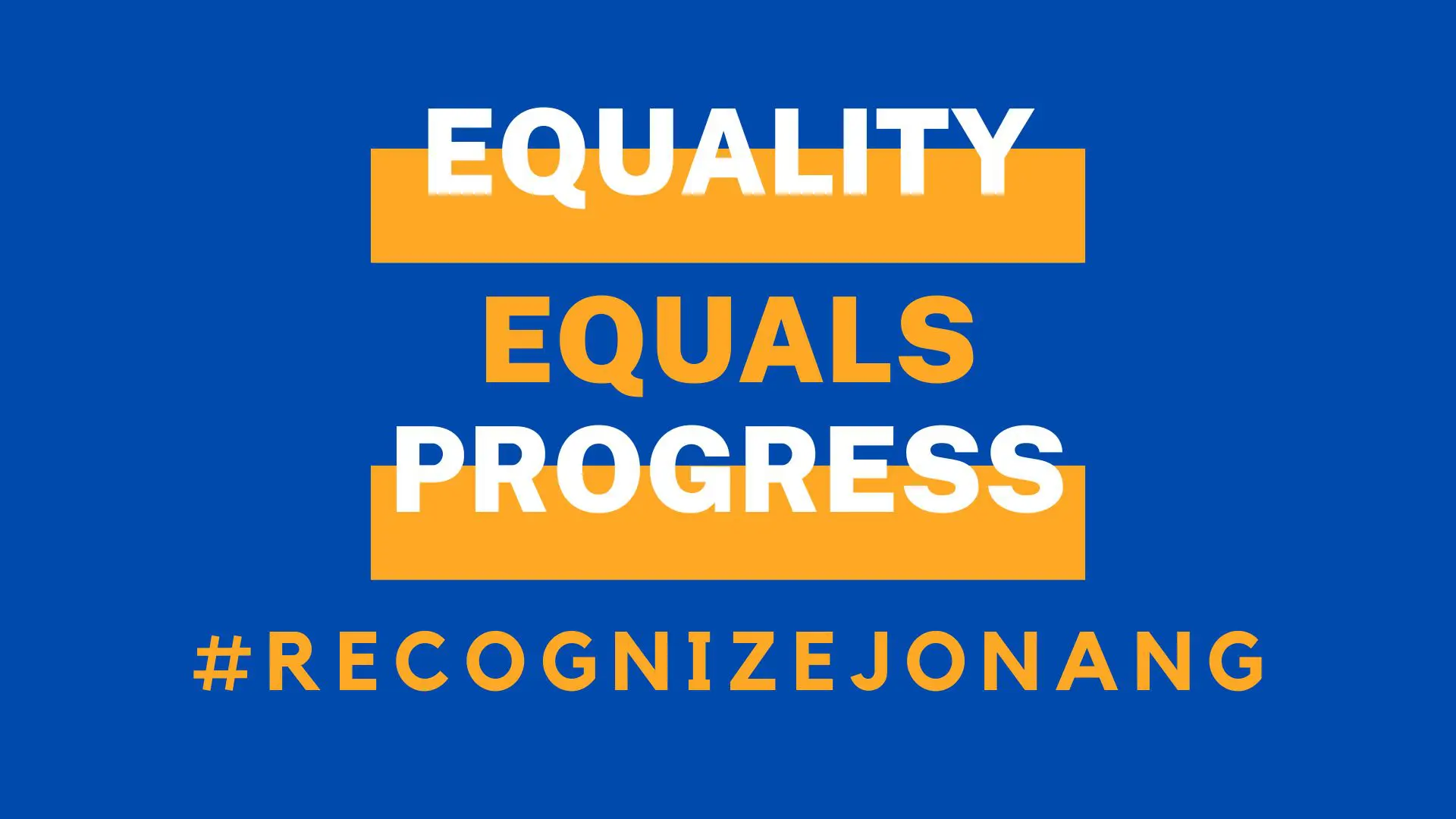#Recognizejonang
Gleiche Rechte für die Jonang-Tradition erlangenDringende Bitte um Ihre Unterstützung
Das Tibetische Parlament im Exil CTA erkennt nicht alle tibetisch buddhistischen Traditionen gleich an. Sie erkennen die Bön, Nyingma, Kagyu, Sakya und Gelug an. Sie erkennen die Jonang Tradition NICHT an. Helfen Sie uns, sie aufzufordern, dies zu ändern, um die Jonang-Tradition anzuerkennen, und zu bewahren, das weltweite Bewusstsein für die Tradition zu verbessern und die Gleichstellung aller tibetisch-buddhistischen Traditionen zu gewährleisten, für alle weltweit ansässigen Tibeter.
#RECOGNIZEJONANG
Dzokden folgt dem erhabenen Pfad des Jonang Kalachakra und vertritt die Rime-Sichtweise, die den Respekt für alle religiösen Traditionen fördert. Dieses Anliegen steht in direktem Zusammenhang mit unserem Bestreben und ist von großer Bedeutung für unsere buddhistische Gemeinschaft und ebenso für die Schaffung eines Goldenen Zeitalters des Friedens und der Toleranz.
Unterzeichnen Sie die Petition um unsere kollektive Unterstützung für diese Sache zu demonstrieren. Mit Ihrer Unterschrift tragen Sie zu einer breiteren Bewegung bei, die sich für ein integratives religiöses Umfeld einsetzt und sicherstellt, dass alle Traditionen mit Respekt und Achtung behandelt werden.
Wie Sie helfen können
Bereits seit 25 Jahren versuchen die Jonangpas, dieses Ziel zu erreichen. Wir brauchen die Hilfe von möglichst vielen Menschen weltweit, damit die Briefe der Jonang und der Tibeter auf Gehör stoßen.

Unterzeichnen Sie die Petition auf Change.org
Das hilft uns, eine noch größere Anzahl von Menschen zu erreichen. Je mehr Unterstützer wir sammeln können, desto größer ist die Chance, dass unsere Stimme gehört wird.

Teilen Sie die Petition in den sozialen Medien
Helfen Sie uns, mehr Menschen zu sensibilisieren. Teilen Sie die Change.org-Petition in den sozialen Medien. Verwenden Sie den Hashtag:
#RecognizeJonang
Schreiben Sie einen Brief an die CTA (Tibetische Regierung im Exil)
Bitte schreiben Sie an die Beamten der CTA und lassen Sie sie wissen, dass wir wollen, dass sie die Jonang-Tradition gleichberechtigt vertreten. Drucken Sie diesen Brief aus, unterschreiben Sie ihn und schicken Sie ihn ab, damit er zur Kenntnis genommen wird.
Khentrul Rinpoches Botschaft zu #RecognizeJonang
Briefe an das tibetische Parlament CTA
- English Letter
- ༄༅། །བོད་མི་མང་གིས་སྐྱིད་སྡུག་ཅི་བྱུང་ལ་རེ་ལྟོས་བྱ་ཡུལ་སྐབས་བཅུ་བདུན་པའི་བོད་མི་མང་སྤྱི་འཐུས་ཡོངས་དང་། ལྷག་པར་དུ་ད་ལྟའི་བཅའ་ཁྲིམས་བསྐྱར་བཅོས་ཚོགས་ཆུང་ལ་ཆེད་ཞུ།
Im Interesse des Wohlergehens und des spirituellen Nutzens des tibetischen (und nicht-tibetischen) Volkes bitten wir die Mitglieder des tibetischen Parlaments eindringlich, die Jonang-Tradition als offizielle religiöse Organisation innerhalb des tibetischen Buddhismus anzuerkennen. Bitte fordern Sie das Parlament auf, seine Charta zu ändern und die Jonang-Linie als offizielle Glaubensgemeinschaft anzuerkennen. Ihr sollten die gleichen Rechte zuteilwerden, wie auch den Bön-, Nyingma-, Sakya-, Kagyü- und Gelug-Traditionen, und die Traditionen sollten vorzugsweise entsprechend ihrer Entstehung gelistet werden.
Die Jonang-Linie ist seit dem frühen 13. Jahrhundert für den tibetischen Buddhismus von entscheidender Bedeutung. Sie ist die einzige Linie, die die gesamte Praxis der Kalachakra-Vollendungsstufe enthält, und es lässt sich nicht leugnen, dass die Jonangpa einen bedeutenden Beitrag zum philosophischen, spirituellen und kulturellen Erbe des tibetischen Volkes geleistet haben.
Leider wird die Jonang-Tradition aufgrund der fehlenden formellen Anerkennung durch die tibetischen Exilpolitiker in Indien nicht in gleicher Weise gefördert wie die anderen tibetisch-buddhistischen Schulen. Infolgedessen besteht die reelle Gefahr, dass die reichhaltige Sammlung von Lehren und Praktiken für immer verloren geht.
Als engagierte Unterstützer und Befürworter religiöser Vielfalt fordern wir das Parlament auf, seine Position zu ändern und seine Charta mit sofortiger Wirkung zu ändern. Diese Anerkennung ist nicht länger nur eine nationale Angelegenheit, sondern erweckte großes Interesse und Befürwortung durch eine Vielzahl von ausländischen Schülern und Praktizierenden. Das Ausbleiben einer offiziellen Anerkennung und Gleichberechtigung innerhalb des tibetischen Buddhismus hat unnötige Verwirrung und Unsicherheit hinsichtlich des Engagements des tibetischen Exilparlaments für religiöse Vielfalt und Inklusion geschaffen.
Die offizielle Anerkennung der Jonang-Tradition wird es dem Parlament ermöglichen, jeden Zweifel an seinem Engagement für die Erhaltung aller authentischen tibetisch-buddhistischen Überlieferungslinien auszuräumen. Daher ist dies ein DRINGENDER Appell der internationalen Gemeinschaft an das tibetische Exilparlament, offiziell und formell für eine Änderung seiner Charta zu stimmen, und das schwerwiegende Versäumnis um die Anerkennung der Jonangpa zu korrigieren – eine Entscheidung, die schon lange überfällig ist. Wie den Mitgliedern des Parlaments bekannt ist, haben bereits mehrere Regierungen, darunter auch China, sowie andere buddhistische Organisationen in Tibet die Jonang-Linie offiziell anerkannt.
Durch eine förmliche Änderung dieser Charta kann das Parlament seine Position als Verfechter von Gleichstellung, Gerechtigkeit sowie geistiger und kultureller Vielfalt sichern. Die gesamte Weltgemeinschaft wartet auf Ihr entschlossenes Handeln, um diese seit langem bestehende Ungleichheit zu beseitigen.
༄༅། །བོད་མི་མང་གིས་སྐྱིད་སྡུག་ཅི་བྱུང་ལ་རེ་ལྟོས་བྱ་ཡུལ་སྐབས་བཅུ་བདུན་པའི་བོད་མི་མང་སྤྱི་འཐུས་ཡོངས་དང་། ལྷག་པར་དུ་ད་ལྟའི་བཅའ་ཁྲིམས་བསྐྱར་བཅོས་ཚོགས་ཆུང་ལ་ཆེད་ཞུ།
ད་ཐེངས་བོད་མིའི་སྒྲིག་འཛུགས་ཀྱིས་བཅའ་ཁྲིམས་བསྐྱར་བཅོས་ཆེད་འབྲེལ་ཡོད་མི་མང་ཀུན་གྱིས་བསྐྱར་བཅོས་སྐོར་ལ་བསམ་ཚུལ་འདོན་ཆོག་པར་གོ་སྐབས་སྤྲད་པ་འོས་ཤིང་འཚམ་པས་བསྔགས་པར་འོས།
བོད་མིའི་སྒྲིག་འཛུགས་འདི་བོད་མི་རིགས་ཀྱི་ཆོས་ལུགས་དང་རིག་གཞུང་ཡུལ་སྲོལ་དང་བཅས་པ་མི་ཉམས་གོང་འཕེལ་གཏོང་ཆེད་ཡིན་ན། བོད་ཀྱི་སྒྲུབ་བརྒྱུད་ཤིང་རྟ་བརྒྱད་ཀྱི་ཡ་གྱལ་དང་། ད་ལྟའི་བོད་ཀྱི་ཆོས་བརྒྱུད་ཆེ་ཤོས་དྲུག་གི་ཡ་གྱལ། དཔལ་ལྡན་རྒྱལ་བ་ཇོ་ནང་བ་ལ་བཅའ་ཁྲིམས་ཀྱིས་མཚོན། གཞུང་འབྲེལ་ཡིག་ཆ་ཁག་ཏུ་ཆོས་རྒྱུད་དེ་དག་དང་སྤྱི་མཚུངས་གཅིག་མཐུན་གྱི་མཚན་གནས་དང་གོ་ཐོབ་མེད་པ་ནི་ཆེས་མ་འོས་པར་གཟུར་གནས་བློ་ལྡན་ཀུན་གྱིས་ཤེས་ཀྱི་ཡོད་ལ། དཔེར་ན་མི་ཞིག་ལ་མིང་གི་གོ་ཐོབ་ཙམ་ཡང་མེད་པ་ལྟ་བུའོ།
ལྷག་པར་དུ་མི་ལོ་༢༥ ལ་ཇོ་ནང་བ་གཞིས་བྱེས་གཉིས་ཀྱིས། བོད་མིའི་སྒྲིག་འཛུགས་ལ་བརྩི་བཀུར་དང་མཐོང་ཆེན། བཟོད་སྒོམ་ཆེན་པོའི་ངང་ནས་རེ་ཞུ་ལན་གྲངས་སྟོང་ལ་ཉེ་བ་ཕུལ་ཀྱང་། སྤྱི་འཐུས་ཀྱི་ངང་ཚུལ་འཆང་བ་ཁག་ཅིག་གིས། སྒེར་སེམས་དང་ཕུགས་རྒྱང་ཐུང་བའི་ཕྱོགས་རིས་ཁོ་ན་ཡིས། ཞུ་དོན་རྣམས་གནད་སྨིན་དོན་ལྡན་དུ་འགྲོ་བར་འགོག་རྐྱེན་བྱས་པ་ནི། ཆེས་ཤིན་ཏུ་མ་འོས་པ་རུ། བོད་རིགས་དང་བོད་མ་ཡིན་པའི་ཤེས་ལྡན་མང་པོས་གླེང་སློང་བྱེད་ཀྱི་ཡོད།
རྒྱུ་མཚན་ནི། ཁྲིམས་ཀྱི་མདུན་སར་འདྲ་མཉམ་དང་གཅིག་མཚུངས་མེད་ན། མང་གཙོ་ཅན་གྱི་གཞུང་ཡིན་ཟེར་བ་ནི་འགལ་འདུ་ཁོ་ནའི་ཕུང་བོ་ལས་མེད་པས། ཁྲིམས་བཟོ་ལྷན་ཁང་རང་ཉིད་ལ་འོས་ཆོས་མེད་པར་གྱུར་བ་ལ་སོགས་པའོ།།
བཅའ་ཁྲིམས་ཀྱི་ནང་དུ་བོད་ཀྱི་ཆོས་རྒྱུད་ལྔ་པོ་ལ་མཚན་གནས་ཐོབ་ཐང་གཅིག་པ་གཅིག་མཚུངས་ཡོད་པ་བཞིན་དུ། ད་ཐེངས་བཅའ་ཁྲིམས་བསྐྱར་བཟོ་ཡི་སྐབས་སུ། དཔལ་ལྡན་རྒྱལ་བ་ཇོ་ནང་བ་ལ་ཡང་ཆོས་བརྒྱུད་གཞན་ཀུན་དང་གཅིག་མཚུངས་འདྲ་མཉམ་གྱི་ཐོབ་ཐང་ཞིག་ཅི་ནས་ཀྱང་སྤྲོད་དགོས། འདི་ནི་ཡོངས་གྲགས་བོད་ཀྱི་ཆོས་བརྒྱུད་ལྔ་ལ་འདྲ་མཉམ་གཅིག་མཚུངས་གི་ཐོབ་ཐང་ཅི་ལྟ་བ་བཞིན་དུ། དཔལ་ལྡན་རྒྱལ་བ་ཇོ་ནང་བ་ལ་ཡང་དེ་མཚུངས་སུ་སྤྲོད་དགོས་པའི་རེ་ཞུ་ཁོ་ན་ཡིན་པ་ལས་གཞན་ཅི་ཡང་མིན་པས། འདི་ལ་ལོག་འགྲེལ་མ་གནང་ཞེས་རེ་བ་སྙིང་ནས་ཞུ་ན་འདི་ཉིད་ཆེས་གལ་ཆེན་དུ་ཤེས་པར་འཚལ་ལོ།།
བྱེ་བྲག་ཏུ། བཅའ་ཁྲིམས་ལེའུ་ལྔ་པའི་ནང་ཚན་དོན་ཚན་སོ་བདུན་པའི་ཁ་པ་ལ་འགྱུར་བ་བཏང་སྟེ། གཡུང་དྲུང་བོན། རྙིང་མ། ས་སྐྱ། བཀའ་བརྒྱུད། ཇོ་ནང་། དགེ་ལྡན་པ་བཅས་སོགས། ཐོབ་ཐང་གཅིག་མཚུངས་དང་། གོ་རིམ་ཡང་བྱུང་རིམ་བཞིན་དུ་འགྱུར་བ་བཏང་དགོས་ངེས་རེད། གལ་ཏེ་ཆོས་བརྒྱུད་ཀུན་ལ་སྤྱི་འཐུས་སོགས་མི་དགོས་ན། ཇོ་ནང་པ་ལ་ཡང་འདྲ་མཉམ་ཡིན་ཕྱིན། དེ་དག་ལ་དགག་བྱ་དང་འཁང་ར་སོགས་ཅི་ཡང་མེད་ངེས་ཡིན།
གལ་ཏེ་དེ་དག་ལ་སོགས་པ་ལ་འགྱུར་བ་ཡང་མ་བཏང་། འདྲ་མཉམ་གྱི་གོ་ཐོབ་རྣམས་ཀྱང་མ་སྤྲད་ན། དེ་ནི་ཆེས་མི་འོས་པའི་རྒྱུ་མཚན་མང་བ་འདི་ལྟར། གཅིག བཅའ་ཁྲིམས་ལེའུ་དགུ་བ་དང་བཅུ་བ་སོགས་ཀྱི་ནང་དུ་ཁྲིམས་ཀྱི་མདུན་སར་ཐོབ་ཐང་གཅིག་མཚུངས་སུ་གསུངས་བ་དང་དངོས་སུ་འགལ་བ། གཉིས། བོད་ཀྱི་ཆོས་བརྒྱུད་ཚོའི་ཚོགས་ཆེན་ཐེངས་བཅུ་གཅིག་པའི་སྟེང་གི་༧གོང་ས་མཆོག་དང་ཆོས་བརྒྱུད་ཀུན་གྱི་དབུ་ཁྲིད་ཚོའི་བཀའ་དགོངས་དང་འགལ་བ་མ་ཟད། བཅའ་ཁྲིམས་དོན་ཚན་དང་བོ་དང་འགལ་བ།
གསུམ། རྒྱལ་སྤྱིའི་ཆོས་འབྱུང་ལོ་རྒྱུས་དང་འགལ་བའི་ཉེས་ཅན་དུ་གྱུར་བ། བཞི། འཛམ་གླིང་གི་ལོ་རྒྱུས་རིག་པ་བ་དང་། མཚན་ཉིད་སྨྲ་བ་སོགས། རྒྱལ་སྤྱིའི་མཁས་པ་ཚོའི་མདུན་སར་ངོ་ཚ་ཉོ་པ།
ལྔ། བཅའ་ཁྲིམས་རང་དང་མ་མཐུན་ན་ཁྲིམས་བཟོ་བ་རྣམས་ཁྲིམས་ཀྱི་ནག་ཉེས་ཅན་དུ་གྱུར་བ།
དྲུག དམངས་ཀྱི་རེ་བ་སྟོང་ཟད་དུ་གཏོང་བའི་གཞུང་ཞིག་ཏུ་གྱུར་ན། གཟུར་གནས་ཕྱི་རབས་པ་རྣམས་ཀྱིས་རྒྱབ་སྐྱོར་མེད་པའི་ཉེས་ཅན་དུ་གྱུར་བ།
བདུན། རྒྱལ་སྤྱིའི་གཞུང་སྒེར་གཉིས་ཀྱིས་བོད་མིའི་ཆེ་མཐོང་བརླག་ངེས་སུ་གྱུར་བ།
བརྒྱད། ཐ་ན་རྒྱུན་དུ་སྐྱོན་བརྗོད་བྱ་ཡུལ་གྱི་རྒྱ་ནག་གཞུང་གིས་ཆོས་བརྒྱུད་ཀུན་ལ་འདྲ་མཉམ་དུ་སྤྲད་ཡོད་པ་ཙམ་ཡང་མ་སྤྲད་པར་སྣང་བས་ན། བློ་དང་ལྡན་པ་སུ་གང་གིས་ཀྱང་བསམ་ཡུལ་ལས་འདས་པས། དེ་ལ་ཡག་པའི་འགྲེལ་བཤད་གང་ཡང་གནང་ཚུལ་གཏན་ནས་མེད་པ།
དགུ བོད་མའི་སྒྲིག་འཛུགས་ལ་རྒྱབ་སྐྱོར་གནང་མཁན་གྱི་རྒྱལ་ཁབ་རྣམས་ཀྱིས་ཀྱང་བློ་ཡུལ་དུ་མི་ཤོང་བར་གྱུར་ངེས་པས། ཁོང་ཚོས་བརྩི་བཀུར་དང་གདེང་འཇོག་བརླག་ནས་རྒྱབ་སྐྱོར་འཚམས་འཇོག་བྱེད་ཉེན་ཤིན་ཏུ་ཆེ་བ།
བཅུ། མ་ཟད་ཇོ་ནང་བ་ཡོངས་དང་གཞན་བློ་ལྡན་གྱི་བོད་མི་མང་བོས་རང་གཞུང་ལ་ཁོ་ཐག་ཆད་ནས་ཆེ་མཐོང་བརླག་ན། དམངས་མེད་དོན་མེད་ཀྱི་སྒྲིག་འཛུགས་ཤིག་ཏུ་འགྱུར་སྲིད་པས། དེ་ལ་སོགས་པ་ལ་བློ་དང་ལྡན་པ་ཀུན་གྱིས་བསམ་གཞིགས་ནན་མོ་གཏོང་བར་ཅི་ནས་ཀྱང་རེ་བ་ཤིན་ཏུ་ཆེ་ཞུ།
སྙན་ཞུ་འདི་དག་ནི་སྔར་བཞིན། བོད་མིའི་གཞུང་དང་སྒྲིག་འཛུགས་ལ་སྐྱོན་བརྗོད་རེད་ཅེས། ལོག་འགྲེལ་མི་བྱེད་པར་མཁྱེན།
འོན་ཀྱང་། སྔོན་ཆད་ཡང་ཡང་བྱུང་བ་བཞིན་དུ། གལ་ཏེ་ད་ཐེངས་ད་དུང་ཇོ་ནང་བ་ལ་གཅིག་མཚུངས་ཀྱི་ཐོབ་ཐང་སྤྲོད་པའི་བཅའ་ཁྲིམས་བསྒྱུར་བཅོས་ལ་འགལ་རྐྱེན་བཟོ་མཁན་དང་། རྒྱབ་སྐྱོར་མི་བྱེད་མཁན་སུ་ཡང་མེད་པའི་རེ་བ་རྒྱ་ཆེར་ཞུ། གལ་ཏེ་ཡོད་ན་ནི། ཀུན་གྱིས་ཤེས་གསལ་ལྟར་དཔལ་རྒྱལ་བ་ཇོ་ནང་བ་ནི་ས་སྒང་གོ་ལ་འདིའི་སྟེང་དུ། དཔལ་དུས་ཀྱི་འཁོར་ལོའི་བསྟན་པ་ཡོངས་རྫོགས་འཛིན་མཁན་གཅིག་པུ་ཁོ་ན་དེ་ཡིན་པས། གནད་དོན་འདི་ནི་གོ་ལ་ཧྲིལ་བོའི་དཔལ་དུས་ཀྱི་འཁོར་ལོའི་བསྟན་པའི་གནས་བབས་དང་། འཛམ་གླིང་རྫོགས་ལྡན་གསར་བ་བསུ་བར་འབྲེལ་བ་དམ་ཟབ་ཡོད་པས། འཛམ་གླིང་རྒྱལ་སྤྱིའི་གནད་དོན་ཟབ་མོ་ཅན་དུ་བཟོ་མི་རུང་པ་ཅི་ནས་ཀྱང་མཁྱེན་པར་འཚལ།
སྔར་བཞིན་བོད་མི་རིགས་ཀྱི་ཞབས་འདྲེན་དང་བླ་བཙོང་མི་གནང་བར། ད་ཐེངས་ནི་བོད་མིའི་སྐུ་ཚབ་མི་རེ་ངོས་རེས་བོད་མི་མང་གིས་སྤྱི་འཐུས་རྣལ་མ་ཞིག་གི་འགན་ཁུར་ཏེ། ད་རེས་ནི་དཔལ་རྒྱལ་བ་ཇོ་ནང་པ་ལ་བཅའ་ཁྲིམས་ཀྱི་ཐོག་ནས། ཆོས་བརྒྱུད་འདྲ་མཉམ་གྱི་ཐོབ་ཐང་གཅིག་མཚུངས་སུ་སྤྲད་དེ། གཞུང་འབྲེལ་ཡིག་ཆ་ཐམས་ཅད་དུ་གཅིག་མཚུངས་ཀྱི་མཚན་ཐོབ་ཡོད་པ་ཞིག་ཅི་ནས་ཀྱང་གནང་བར་གསོལ་བ་རྩེ་གཅིག་ཏུ་འདེབས་ན། བོད་མི་རིགས་སྤྱིའི་ལ་རྒྱ་དང་མཚན་གནས། མ་འོངས་ཕྱི་རབས་བོད་མིའི་མདུན་ལམ་དང་། མི་རབས་ཕྱི་མ་བ་རྣམས་ཀྱིས་འཁང་ར་བྱ་སའི་ལོ་རྒྱུས་ཀྱི་ནག་ཉེས་ཅན་དུ་མི་འགྱུར་པར། ང་ཚོའི་རེ་འབྲས་སྟོང་ཟད་དུ་མི་གཏོང་བར་ཞུ་ཞུ་ཞུ།། །།
བོད་རྒྱལ་ལོ་༢༡༥༠ལོའི་བོད་ཟླ་༦ པའི་ཚེས་༧ ལ་འཛམ་གླིང་དཔལ་རྒྱལ་སྤྱིའི་རྫོགས་ལྡན་གསར་བ་བསུ་བའི་ལྷན་ཚོགས་ནས། ཕུལ།། །།
Die Bedeutung der Jonang-Tradition
Die Jonang-Tradition enthält einige der vielfältigsten und umfassendsten Lehren des tibetischen Buddhismus, darunter den Dzokden-Dharma von Dolpopa Sherab Gyaltsen. Die Jonang-Tradition ist seit dem frühen 13. Jahrhundert für den tibetischen Buddhismus von entscheidender Bedeutung. Sie ist die einzige Übertragungslinie, die die gesamte Praxis der Kalachakra-Vollendungsstufe enthält, und es lässt sich nicht leugnen, dass die Jonang einen bedeutenden Beitrag zum philosophischen, spirituellen und kulturellen Erbe des tibetischen Volkes geleistet haben. Es wurde prophezeit, dass das Kalachakra-Tantra ein goldenes Zeitalter des Weltfriedens und der Harmonie in unsere Welt bringen wird. Daher ist diese Tradition nicht nur für den tibetischen Buddhismus von großer Bedeutung, sondern um so mehr auch für die Zukunft der Menschheit.


Warum dies bisher noch nicht erreicht werden konnte
Die Jonang-Tradition war in der Geschichte Tibets noch nie in Politik involviert. Viele Tibeter, die Seiner Heiligkeit dem Dalai Lama aus Tibet folgten, kamen aus den Wustang-Regionen, in denen es nicht viele Jonangpas gab. Die Yogis und Mönche der Jonang-Linie, die hauptsächlich in Amdo lebten, verließen Tibet nicht. Sie konzentrierten sich stattdessen auf die Verwirklichung der Yogas, Lehren und Praktiken. Bis zum heutigen Tag lebt und praktiziert die Mehrheit der Jonang im heutigen China in ihren Häusern, Höhlen, Zelten und Klöstern.
Viele der ursprünglichen CTA-Politiker im Exil kamen aus Regionen ohne Jonang-Tradition und waren über deren Existenz nicht im Bilde. Sie wurde daher nicht von Anfang an als eine der tibetischen Traditionen aufgeführt.
In den 1990er Jahren schickten die Jonang im Exil Tausende von Briefen an die CTA und standen zeitweise kurz davor, eine Vertretung zu erhalten. Obwohl sie nahe dran waren, erreichten sie nie die notwendige 2/3-Mehrheit der Beamten, um ihre Anerkennung zu erreichen. Dies war zum Teil auf einen Machtkampf darüber zurückzuführen, wie Rechte an Regionen verteilt wurden, mehr auf religiösen Traditionen und nicht so stark auf die Religion selbst bezogen. Das bedeutet jedoch nicht, dass es richtig ist, die religiöse Gleichheit zugunsten regionaler Kämpfe zu ignorieren. Es ist an der Zeit, dass die CTA die Jonang-Tradition anerkennt, damit die gleichen Anstrengungen unternommen werden, um das Bewusstsein für deren Existenz und ihren Erhalt weltweit zu fördern.
Warum es wichtig ist, dies zu ändern
Die Anerkennung und Vertretung der Jonang-Traditionen hat Auswirkungen auf viele Dinge, einschließlich:
- In den Schulbüchern der CTA wird derzeit nur über 5 tibetische Traditionen gelehrt. Tibeter im Exil und westliche Menschen, die sich auf die offizielle Liste beziehen, erfahren nichts über die Jonang-Tradition.
- Die Anerkennung der Jonang-Tradition würde helfen, das Erbe der Lehren des Goldenen Zeitalters von Shambhala und Kalachakra zu bewahren, da sich mehr Menschen der Existenz dieser Traditionen bewusst würden.
- Es wäre auf einer Linie mit Seiner Heiligkeit dem Dalai Lama, der anerkennt, dass die Jonang-Tradition eine eigenständige Tradition ist und neben allen anderen tibetischen Dharma-Traditionen gleichberechtigt sein sollte.
- Eine aktualisierte Dharma-Historie Tibets würde in der Welt bekannt werden, die der wahren Geschichte gerecht wird.
- Die Anerkennung aller wichtigen Traditionen würde eine unvoreingenommene Rime-Sicht und Inklusivität fördern.

